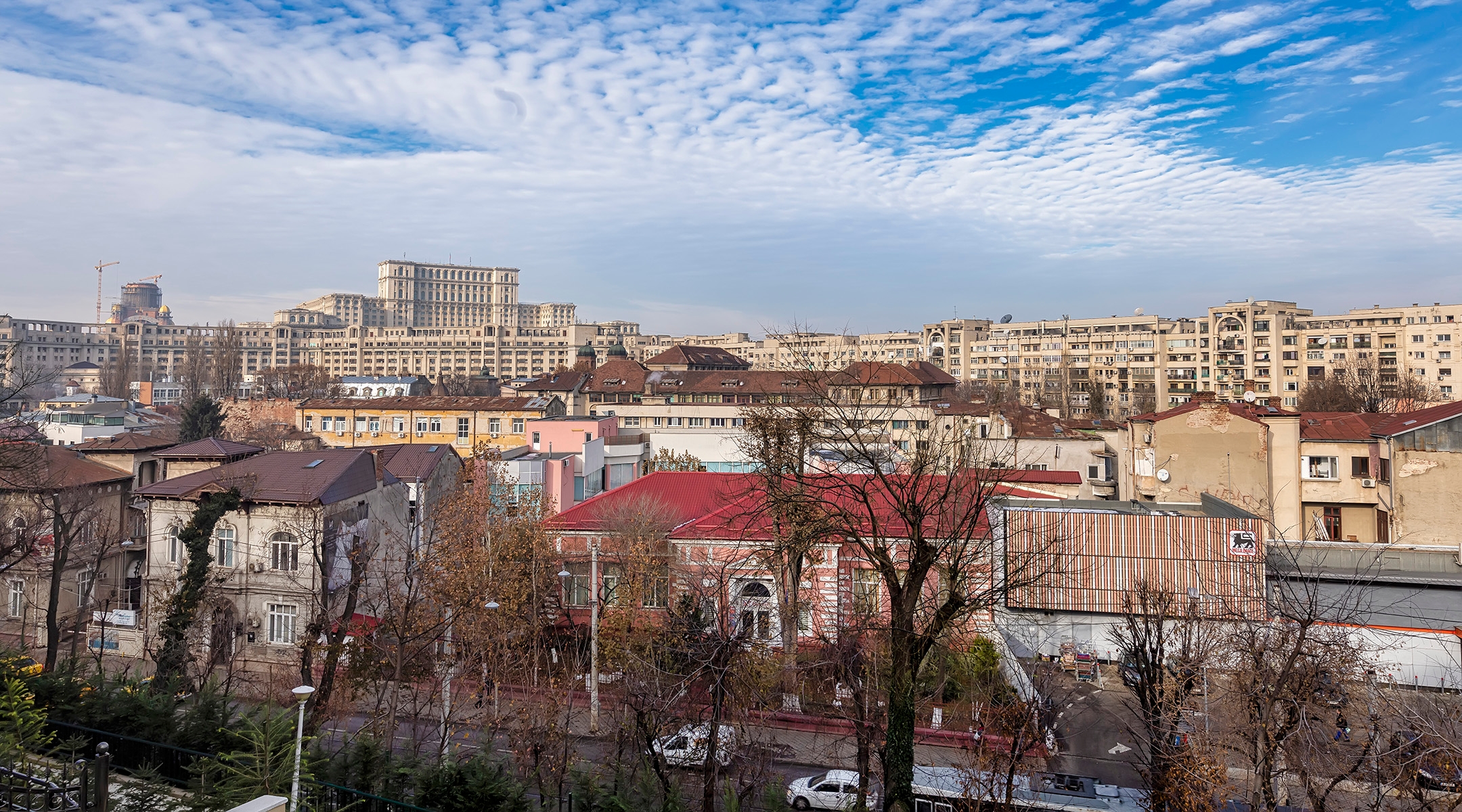Romanian city council votes down plan to remove bust of pro-Nazi government official
The Elie Wiesel Institute for the Study of the Holocaust in Romania said that “war criminals” such as Mircea Vulcanescu continue “to be treated as civic models by authorities”

Downtown Bucharest and the Romanian parliament building are seen from the city’s Patriarchal Cathedral, Dec. 8, 2018. (Laszlo Szirtesi/Getty Images)
BUCHAREST (JTA) — Watchdogs in Romania slammed an administrative unit of Bucharest’s city council for refusing to dismantle a bust honoring Mircea Vulcanescu, who served as a finance minister in the country’s pro-Nazi government during World War II.
On Wednesday, Sector 2 of the city council voted down a resolution that would have removed the monument from Saint Stefan park in the Romanian capital. The resolution, which attracted national attention, was initiated by a local councilor from the center-right National Liberal Party and failed to be adopted as a majority of councilors abstained.
Parliament member Antonio Andrusceac, of the far-right and nationalist Alliance for the Union of Romanians party, was present at the vote and accused the Elie Wiesel Institute for the Study of the Holocaust in Romania — a public institution which has long championed the removal of monuments honoring Nazi figures and collaborators — of “rewriting Romanian history and demolishing the cult of its heroes and martyrs.”
The Wiesel Institute sees the refusal to adopt the motion as a violation of a law adopted by the Romanian parliament in 2002 and revised in 2015, which made glorifying figures guilty of crimes against humanity illegal.
The preservation of Vulcanescu’s bust, the Wiesel Institute added in a statement on Wednesday, is also in contradiction with a national strategy to fight antisemitism adopted by Romania in 2021.
“This public policy remains only on paper as long as war criminals, members of the Antonescu government, continue to be treated as civic models by authorities,” the Wiesel Institute said in the statement.
Maximilian Marco Katz, head of the Bucharest-based Center for Monitoring and Combating Antisemitism, also critiqued the council’s vote.
“During WWII, Mircea Vulcanescu was part of Marshal Antonescu’s government that legislated and implemented antisemitic legislation and measures that resulted in the Romanian Holocaust,” he wrote in a statement to the Jewish Telegraphic Agency.
Ion Antonescu, Romania’s prime minister in the early 1940s, sided with Adolf Hitler during the war. Between 280,000 and 380,000 Romanian Jews were killed in the Holocaust.
Katz recalled that, in 1946, Vulcanescu was sentenced to 8 years in prison by post-war communist authorities, which found him guilty of collaborating with Nazi Germany and imprisoned him until his death in 1952. Vulcanescu had taken part in the adoption of legislation to overtax Jews and strip them of property.
Vulcanescu’s daughter Maria has sought her father’s rehabilitation, invoking the violation of due process that characterized post-war communist trials. But the Bucharest Court of Appeal dismissed her legal claim in 2019
As a result of that court decision, said Katz, Vulcanescu remains “a war criminal”, for which “all those who opposed or abstained” the motion to remove the monument “acted knowingly against” Romania’s 2002 law aimed at figures found guilty of war crimes.
Mircea Vulcanescu’s legacy as both an intellectual and a high ranking official has been at the center of repeated controversies since the fall of communism in 1989. Several historians and intellectuals, as well as nationalist groups and some activists advocating for the memory of the victims of communism, deny his role in the persecution of Jews and have signed a number of appeals in his defense. His defenders say he openly protested some of the Antonescu regime’s antisemitic measures and even tried to mitigate their effects.
This article originally appeared on JTA.org.





















